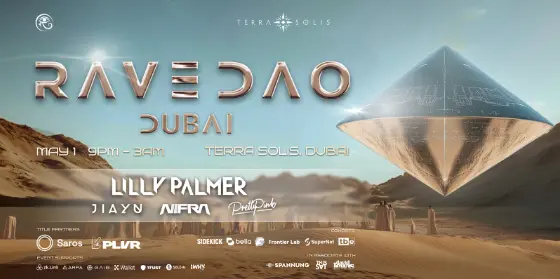Comprehensive Interpretation of Investment DAOs: Could They Become the Next Trend?
Author: Marina, W3.Hitchhiker
At the end of July 2021, a decentralized autonomous organization named "PleasrDAO" came together to spend up to $4 million to purchase the only existing copy of the Wu-Tang Clan album "Once Upon a Time in Shaolin." This was not the first time PleasrDAO made a significant purchase of collectibles; earlier in June, the organization bought the original Doge meme NFT for $4 million. PleasrDAO has millions of dollars dedicated to investing in rare collectibles, making it look like a conventional investment firm. However, we all know its biggest difference is that it operates on blockchain technology, which is what we commonly refer to as a DAO (Decentralized Autonomous Organization).
Recently, some DAOs have begun to attract the attention of traditional investment markets and crypto KOLs, including billionaire Mark Cuban, who described DAOs as the ultimate combination of capitalism and progressivism. The well-known crypto investment firm A16Z has also led and structured investments in DAOs, reportedly amounting to millions of dollars.
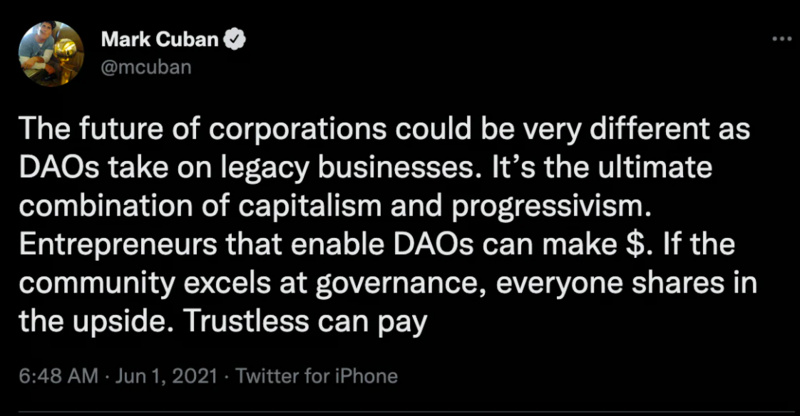
With the bull market in the crypto market in 2021 driving various sectors to engage in intense fundraising, DAOs have captured the attention of market investors over the past two years. Unlike traditional crypto VC firms, Ventures DAOs (commonly referred to as investment DAOs) have begun to shine, and the market is predicting that investment DAOs will become the next trend. The main reason is that this model can liberate talent from traditional corporate frameworks, and if the community performs well in governance, every member can benefit.
Recently, besides the hot chain game STEPN, there has been a FOMO sentiment stirred up by CULT.DAO, a decentralized venture capital institution. Ordinary users find it difficult to participate in primary market investments, especially during overheated market conditions. CULT.DAO's vision is to become the VC for Web3. Clearly, the current market easily treats CULT.DAO as a meme, which is also evident in its token price.
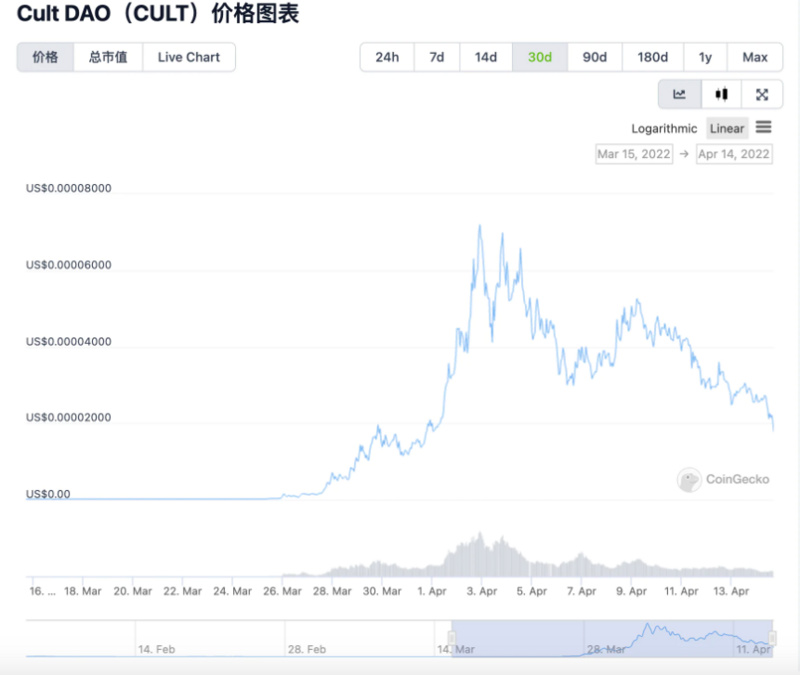
This article will start from the investment DAO segment, discussing its history and current status, detailing several representative investment DAOs, and finally summarizing the potential problems and risks associated with investment DAOs. Large institutional investments have already begun to roll in, and investment DAOs, as another type of "investment entity," are certainly joining the fray.
I. The History of Investment DAOs
The concept of DAO originated from a blog post in 2013, where blockchain developer Dan Larimer coined the term DAC (Decentralized Autonomous Company). He described DAC as an organization driven by interests, defined by code, and operational services obtained by paying for shares in the decentralized autonomous company. A few months later, Vitalik Buterin created the term DAO in an article reflecting on his thoughts.
In May 2016, the first true DAO was established—The DAO (a crowdfunding venture capital fund). It was built on smart contracts on the Ethereum blockchain, with the coding framework developed by the Slock.It team and deployed by members of the Ethereum community under the name "The DAO." The underlying logic of this DAO allowed anyone involved in a project to promote their good ideas and viewpoints, with the opportunity to receive funding from The DAO. Anyone holding DAO tokens could vote on these proposals, and if a project became profitable, rewards would be distributed accordingly.
However, three months after its launch, the fund was hacked, resulting in a loss of $50 million. Unsurprisingly, the market was already skeptical of the investment operations of DAOs, and this theft incident became the first stumbling block on the path of investment DAO development. Subsequently, on July 25, 2017, the U.S. Securities and Exchange Commission (SEC) issued a ruling stating that the tokens offered and sold by the "virtual" organization known as "The DAO" were securities and thus subject to federal securities laws. The report confirmed that, unless an effective exemption was available, issuers of distributed ledger or blockchain-based securities must provide documentation for the registration of such securities' issuance and sale, and participants in unregistered offerings could also be held liable for violations of securities laws.
In other words, the issuance of The DAO was subject to the same regulatory principles as companies undergoing an initial public offering process. According to the SEC, both the DAO and all its investors violated federal securities laws. Although the DAO project has ended, its impact continues. Current blockchain development teams should constantly seek insights and methods from the example of The DAO.
II. The Current Status of Investment DAOs
Today, DAOs have evolved to encompass various businesses and needs. Crypto enthusiast Coopahtroopa, who has been deeply involved in DAOs for years, created an overview of DAOs in 2021.
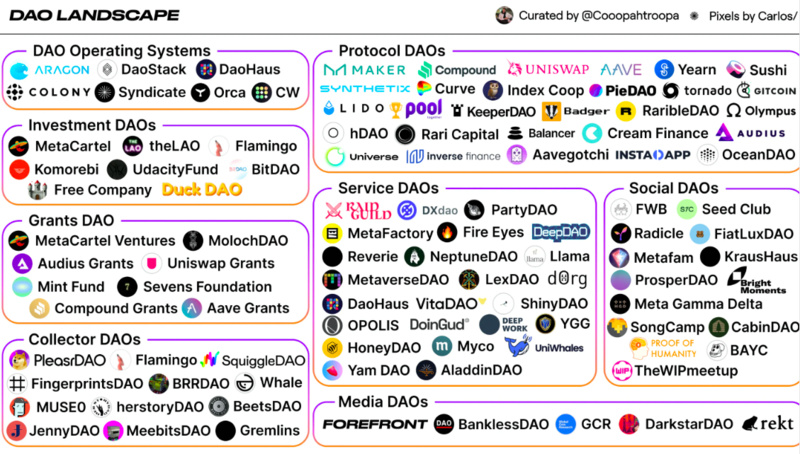
A report from Dovemetrics indicates that among the 84 investment DAOs listed on their site, there have been 561 investments made since these investment DAOs were established. The most active in 2021 were CSP DAO, DuckDAO, The LAO, and Metacartel Ventures. On average, an investment DAO completed 25 investments.
In 2021, there were 94 financing activities announced that involved at least one investment DAO, raising a total of $584 million. From the proportion below, it can be seen that in 2021, large institutions were still the primary investors, with investment DAOs accounting for only about 11%. However, this proportion also indicates that investment DAOs are gradually gaining public recognition and attention.
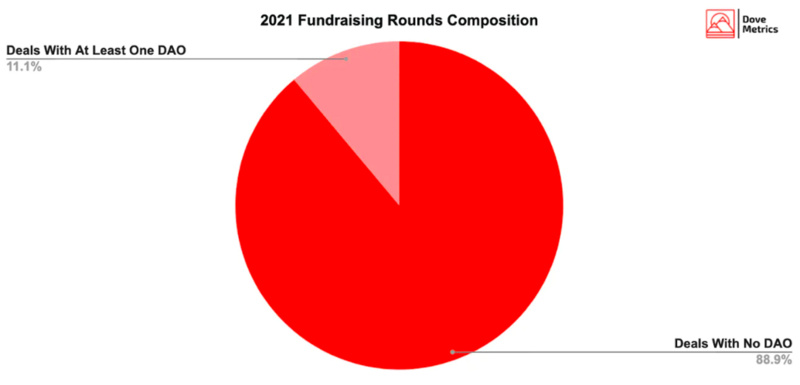
In terms of investment amounts, traditional crypto VCs (excluding investment DAOs) had an average investment amount of $20.5 million in 2021, while investment DAOs averaged $6.2 million.
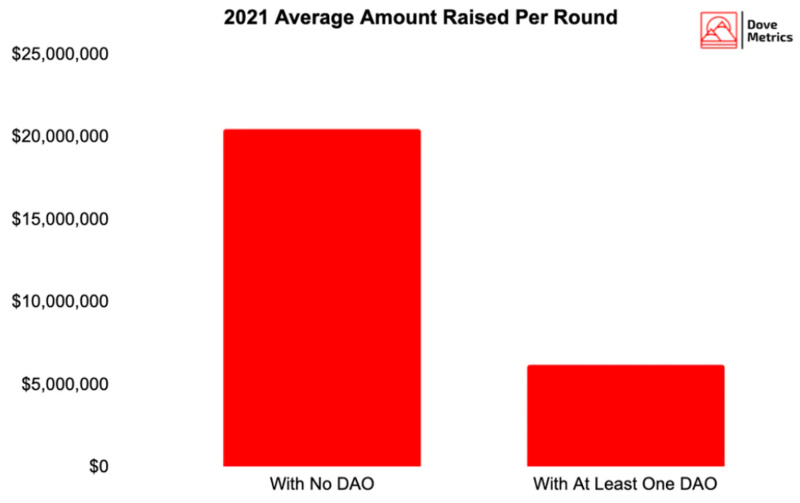
In the investment sector, DeFi remains the favorite area for investment DAOs. Besides the overall investment enthusiasm for DeFi in the crypto market, a significant reason is that some investment DAOs tend to provide funding to DeFi lending protocols and DEXs to offer additional services to their members.
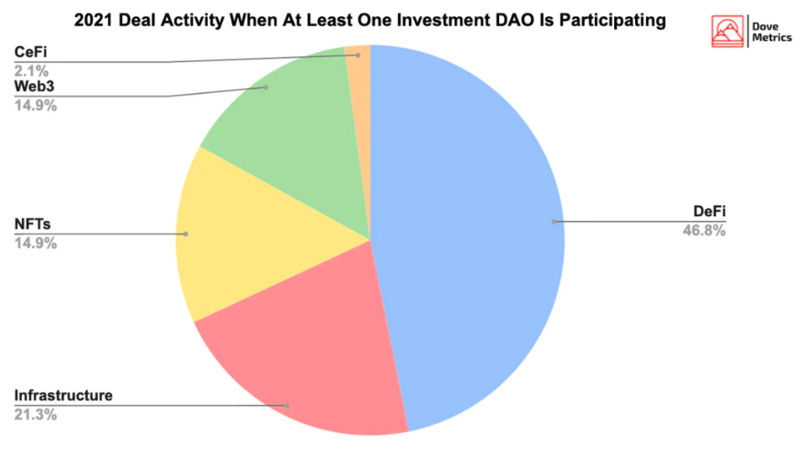
Investment DAOs have become a way for communities to invest in early blockchain projects. However, to avoid U.S. SEC regulations, investment DAOs typically have on-chain components that manage DAO operations in the form of smart contracts and off-chain components that provide some legal liability protection for their members, i.e., the legal structure of the DAO.
III. Several Representative Investment DAOs in the Current Market
There are dozens of investment DAOs on the market. This article selects a few highly representative examples to explore the current development status of investment DAOs.
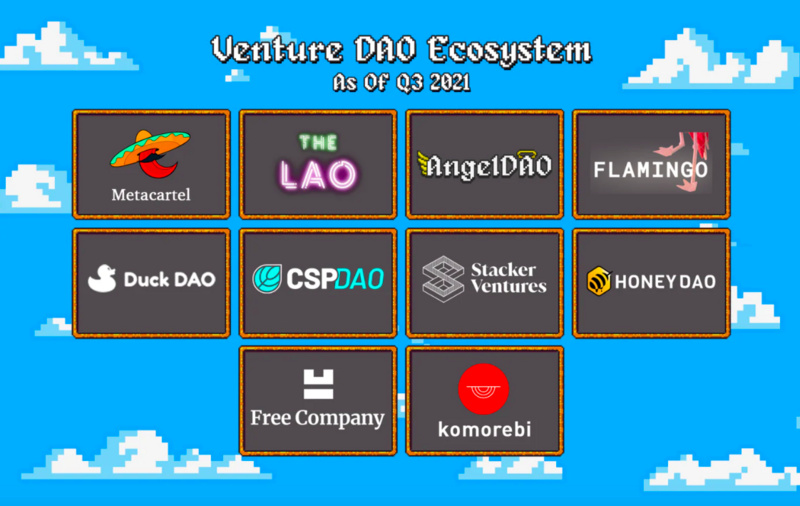
1. MetaCartel Ventures DAO
MetaCartel Ventures was founded in 2019 by Gabriel Shapiro, Peter Pan, and Ameen Soleimani. MetaCartel consists of a large group of native crypto founders, builders, engineers, KOLs, and investors, providing open-source tools and applications to help develop the DAO ecosystem. MetaCartel Ventures is currently not open to new members.
It has become one of the most popular and authoritative investment DAOs in the field, dedicated to investing in early decentralized applications. They have invested in over 40 dApps, including recent investments in Float Capital, Ceramic, and KnownOrigin.
This DAO is based on the Moloch v2 smart contract standard, and to become a member of this DAO, one must be an investor or employee recognized by MetaCartel Ventures. The legal aspect is managed by a Delaware limited liability company, primarily governed by the "Grimoire" ("Limited Liability Company Agreement") and Delaware LLC regulations.
2. The LAO
The LAO is the first profit-oriented investment DAO launched by OpenLaw in 2019, composed of Ethereum enthusiasts and investors who recognize cryptocurrencies. This DAO does not have a clear investment direction or sector. Notably, OpenLaw can create binding legal agreements using tools and bind them to the execution of one or more smart contracts (including those for creating and managing tokens). In this way, any token and smart contract running on Ethereum has legal effect.
The LAO's legal structure is a Delaware limited liability company, and it uses Moloch v2 for its on-chain smart contracts. Membership in the LAO is offered on a first-come, first-served basis. To comply with U.S. laws, membership rights in the LAO are restricted and only open to accredited investors.
3. Flamingo DAO
Flamingo DAO was founded in 2020 by members of The LAO who are dedicated to investing in and managing NFT assets, leading its members to develop and deploy NFT-focused investment strategies. According to the official website's Collection display, Flamingo has purchased NFTs from 140 series, including well-known blue-chip NFTs like Cryptopunk/BAYC, as well as NFTs released by luxury brand LV, covering a wide range.
Flamingo DAO is organized as a Delaware LLC and uses OpenLaw as its DAO management service provider. The DAO employs Moloch v2 smart contracts, and members must be accredited investors as defined by U.S. law.
4. DuckDAO
DuckDAO officially launched on July 14, 2020, and promotes the rapid development of projects by establishing long-term partnerships with supported crypto projects. Additionally, DuckDAO frequently interacts and collaborates with crypto KOLs and celebrities, further expanding its influence after incubating and supporting excellent projects to achieve high returns, collaborating with well-known YouTube influencers like IvanOnTech and Boxmining, who have over 400,000 followers.
Through vigorous community promotion and participation in projects (incubation, social media strategy contributions, and general contributions), as of the date of writing, DuckDAO's official website shows that it currently has 102 portfolios, with the incubated project Base Protocol's token $BASE achieving over 100 times growth, and $GEEQ and $DeFiPie also achieving over 20 times growth.
5. Angel DAO
AngelDAO was founded in 2020 and is operated and managed by a team of four, making it a relatively lightweight DAO. AngelDAO is deployed on Aragon and Gnosis Safe. They invest in various blockchain projects, including blockchain protocols, DeFi applications, and DAOs, and have completed investments in 21 early-stage projects.
IV. Advantages of Investment DAOs
DAOs represent a significant innovation in the crypto community compared to traditional crypto VC investments:
- Investment DAOs allow more people to participate in early-stage crypto project investments.
Historically, large venture capital firms or investors have been able to buy tokens at relatively low prices during a project's early seed or private rounds, and after the project launches, most VCs would sell off to profit, which can harm the long-term development of the project. The existence of investment DAOs can provide community users with opportunities to invest in early projects, countering the traditional VC investment sell-off phenomenon and allowing them to benefit from early project investments.
- Investment DAOs can leverage the wisdom of the crowd to make strategic investment decisions.
DAO communities can gather individuals from diverse professional backgrounds around the world, and distributed work makes their investment decisions more flexible. Diverse community members can contribute value to the investment portfolio. For example, software engineer members can provide insights and opinions from a technical perspective; individuals with rich community operation and marketing experience can help incubated early projects gain rapid exposure; members with excellent graphic design skills can help provide a comfortable UI display interface, and so on.
- Investment DAOs have moved the operation of investment funds on-chain, increasing the transparency of investment decisions.
DAO communities must manage investment funds and decision-making processes through communication and voting, rather than having a centralized leadership group dictate the direction. Investment DAOs aggregate through smart contracts, using multi-signature voting or tokenized voting mechanisms to fund investment projects, and all investment activities can be viewed on-chain. Many DAO tools have emerged to improve governance.
- Compared to traditional crypto VCs, the "entry and exit" of investment DAO members is more flexible.
Depending on the smart contract deployment of different DAOs, any DAO member has the right to exit the DAO at any time, whereas traditional crypto VCs require investors to stay in the fund for a certain period.
V. Issues with Investment DAOs
- Legal and tax restrictions.
The legal and tax implications of DAOs pose risks for investment DAO members. Whether DAOs can be accepted by the government as qualified "investment entities" is a flexible issue, and whether partners not regarded as "legal entities" can become subjects of property registration remains a question; how to submit taxes on profits obtained from investments is also a concern. Therefore, standardizing DAO investments and improving their compatibility with existing legal/tax systems is crucial.
- Security issues.
The current DAO ecosystem is still not sufficiently mature, and the possibility of hacker attacks is a significant risk. One of the largest crowdfunding projects, "The DAO," lost one-third of its raised 11.5 million ETH due to a hacker attack. If such an incident occurs, the lack of investor protection mechanisms could lead to substantial losses for individual investors.
- Investment authority and efficiency issues.
Although DAOs are termed decentralized autonomous organizations, each decision made by a DAO requires on-chain voting. For community members holding a large number of investment DAO tokens, it can be relatively easy to decide whether to invest in or withdraw from a project, which somewhat deviates from the concept of decentralization. Additionally, large institutions may only need a group of people to sit down and hold a meeting to make decisions without putting the investment decision-making process on-chain, which is relatively efficient; whereas DAO decisions generally require voting by community members, who may not know each other and may have varying levels of understanding of the project, leading to inconsistent decision-making efficiency.
- Credit issues with investment projects.
Although investment DAOs can somewhat mitigate the sell-off pressure from large institutions after a project's launch and generally invest smaller amounts than large institutions, the lack of endorsement from large institutions and the uncertainty of early projects should also be considered.
Despite these limitations, investment DAOs undoubtedly provide a way for the general public to access the primary investment market. However, due to the lack of relevant infrastructure and unclear legal status, it is still premature to say that DAOs are a safe form of investment. Although the relevant legal systems are not yet perfect, it cannot be said that DAOs operate without any legal basis within the existing legal framework. The state of Wyoming in the U.S. has passed a law recognizing DAOs as limited liability companies (LLCs). Therefore, once a safe DAO ecosystem and relevant legal systems are established, DAOs could become the future of investment.









